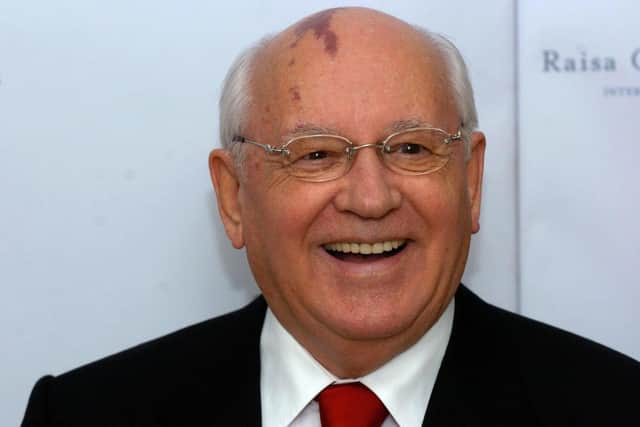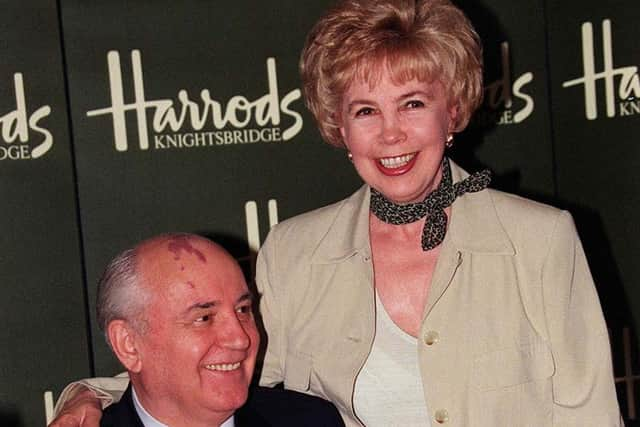Obituaries: Mikhail Gorbachev, Soviet leader who brought down Iron Curtain
Mikhail Gorbachev, the man who brought down the Iron Curtain by introducing Glasnost and Perestroika to the Soviet Union, has died aged 91.
Mr Gorbachev’s arrival as what was to be the last president of the Soviet Union, was a welcome change from the grim-faced, tight-lipped, unbending figures who had preceded him in this office. He was famously the Soviet leader with whom then prime minister Margaret Thatcher said she could do business.
Advertisement
Hide AdAdvertisement
Hide AdNot only Margaret Thatcher but the entire British nation – indeed, the Western world as a whole – warmed to this man with a genial face and a sense of humour who brought with him a refreshing warmth and smile to the cold, dour face of the Kremlin.


It was unthinkable that a man with such a sunny disposition, and seemingly totally lacking the ruthlessness associated with Soviet leaders, could have fought his way to the top of such a fearsome regime.
Even so, he remained a Communist in his thinking – a factor with which his arch-rival Boris Yeltsin, who ultimately hounded him out of office, was cruelly to taunt him.
But his was a form of Communism unlike the obdurate, immovable creed followed by his predecessors. He had a cosmopolitan air and – through a translator – spoke the language of conquering inflation and of turning around the Soviet Union’s politics and economy, both of which were stuck in the quagmire of dogma.
Margaret Thatcher quickly emerged as his most passionate Western supporter and champion of his efforts for reform. He was a man she admired, an accolade she rarely bestowed. What Mrs Thatcher liked about him was that they could argue together, sometimes ferociously, sometimes, as he once put it, “until we were red in the face”.


It was when he visited Britain in 1984, four months before he assumed power, that she said: “I like Mr Gorbachev. We can do business together.” His new style, she said, had “brought hope to the whole world”. And a Foreign Office spokesman said at the time: “It’s nice to find a Soviet politician whose face moves. Even when he scowls, you know where you stand.”
The initial favourable impact he made on Margaret Thatcher and his pursuit of Glasnost (openness) and Perestroika (reconstruction) was to prove an accurate assessment of his qualities.
For Mr Gorbachev is widely reckoned to have done more than anyone – even Yeltsin, a proclaimed free-marketeer – to have delivered the Russian people from the jackboot of Communism.
Advertisement
Hide AdAdvertisement
Hide AdHe was born into famine in a hut on a narrow river, in a village in the state of Stavropol on March 2, 1931, the son of a farm worker, and was a law graduate of Moscow State University, before working as a machine operator and then, from 1955 onwards, devoting much of his time to being a party activist.
He went through the party mill, slowly grinding his way to the top. It was in 1985, only four months after his historic first meeting with Margaret Thatcher, that he became general secretary of the Communist Party, a post which made him top dog in the Kremlin.
In August 1991, Gorbachev was the victim of an old-style hard-line Communist coup in which he and his wife Raisa, their daughter Irina, son-in-law Anatoly and grand-daughter Anastasia, were incarcerated at gunpoint in his holiday home in Crimea.
He described the ordeal as “a severe trauma”, adding: “It was 72 hours of total isolation and confrontation. They tried to break me. When they began to understand that their adventure was over, they were ready to do anything. I had to keep my nerves in check.”
But, although the coup failed, it marked the beginning of the end of his reign as leader and the start of Boris Yeltsin’s rise to power. The relationship between the two men had never been easy. He has described Yeltsin as vindictive, unpredictable and at times unstable.
After the coup episode, Gorbachev continued to visit Britain from time to time, sometimes as part of his Gorbachev Foundation work and on others to promote his memoirs.
He married in 1955. He used to call Raisa “my general” and often relied on her judgment.
Gorbachev was heartbroken and shattered when Raisa died, at the age of 67, in September 1999, after a long battle against leukaemia.
Advertisement
Hide AdAdvertisement
Hide AdBoris Johnson said: “Mikhail Gorbachev is one of those people who changed the world and unquestionably changed it for the better.
"When you look at what he did to make Europe whole, free, to give freedom to the countries of the former Soviet Union – it was quite an extraordinary thing.
“And of course, Mikhail Gorbachev is one of those people who triggered a change, a series of changes, that perhaps he didn’t anticipate. Maybe he paid his own political price for it, but when history is written, he will be, I think, one of the authors of fantastic change for the better in the world.”
Former US secretary of state Henry Kissinger told the BBC’s Newsnight: “The people of eastern Europe and the German people, and in the end the Russian people, owe him a great debt of gratitude for the inspiration, for the courage in coming forward with these ideas of freedom.”
Mr Kissinger, after acknowledging that Gorbachev was unable able to implement his full vision, added: “He will still be remembered in history as a man who started historic transformations that were to the benefit of mankind and to the Russian people.”
OBITUARIES
If you would like to submit an obituary (800-1000 words preferred, with jpeg image), or have a suggestion for a subject, contact [email protected]
SUBSCRIBE
Subscribe at www.scotsman.com/subscriptions
